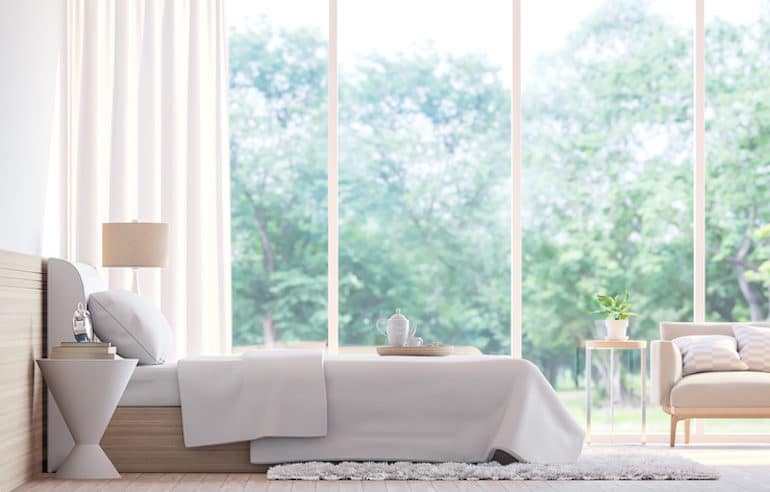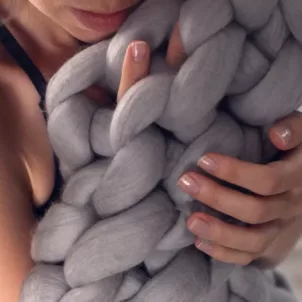Sure, we all sleep—but how many of us truly get a restorative night’s rest? According to a 2016 study by the Centers for Disease Control and Prevention, one in three adults don’t get enough sleep. (The American Academy of Sleep Medicine recommends adults aged 18 to 60 sleep at least seven hours each night to promote optimal health and wellness.) To create a more harmonious place for rest, consider adopting a decluttered feng shui bedroom layout.
For greater insight, we consulted Anjie Cho, an architect, feng shui expert, and author of Holistic Spaces: 108 Ways to Create a Mindful and Peaceful Home. We also chatted with Amy Friedman, founder of Clutter Away LA, a personal organizing business dedicated to clearing your space and mind alike. Here’s their take on small yet impactful steps for better sleep with a calm and clear bedroom.

Why Your Bedroom Matters
A Much needed safe haven
Anjie emphasizes the importance of your bedroom, as it’s your most private space and one in which you spend a lot of time. “Think about how many hours you spend in your bedroom and in bed compared to other places,” she suggests. “If you sleep in a difficult bedroom, where it’s hard to open the door and everything is cluttered, it can affect your day-to-day life.” Similarly, Amy emphasizes the mental and emotional toll that such quarters can create. “A cluttered space usually creates a cluttered mind,” she says, the latter of which can encompass “uneasiness, anxiety, or a general feeling of [lacking] control over your life. It’s pretty hard to fall asleep when you don’t feel relaxed in your space.”How Feng Shui Can Help
Anjie explains that feng shui, which means wind and water, “teaches us how to live in tune with nature.” Feng shui encourages us to “look at our environment, see how the energy flows, and shape it so it can support and enhance our lives,” she continues. But how can you tell if your bedroom is off? “[Determine] if you love your bedroom, or if it’s a place in which you don’t want to spend time,” Anjie advises. Furthermore, if you’re not sleeping well or don’t feel well-rested, your bedroom could likely use some adjustments.
5 Steps to Create a Feng Shui Bedroom Layout
Anchor Your Bed Strategically
“In feng shui, there’s a principle called the commanding position, which governs how you locate yourself in relation to your spaces,” Anjie shares. A solid commanding position, she says, can enable you to “open yourself up to opportunities and see clarity and wisdom in your life.” With this idea in mind, “you want to situate your bed so you can see the door without being directly in line with it,” Anjie continues. Your mind goes into fight or flight mode when you can’t see the door, which can induce stress. Next, invest in a headboard, which can promote stability, support, and an equally balanced space. The key here is to securely fasten it to the bed and position it against a wall with space on both sides.Clean Up Before Bedtime
Clutter can make relaxing difficult and lead to stress and unrest. However, don’t let the potentially daunting task of decluttering cause anxiety. “I always tell my clients to start small,” says Amy. “Maybe that means setting a timer for 10 minutes and focusing on one area in your bedroom. Spending some time addressing the issue is the first step.”Clear Your Nightstand
“Having a clear nightstand is key,” Amy continues. “Decide what really belongs there—perhaps the book you’re currently reading—and put the rest elsewhere, like on a bookshelf or in a cabinet. You can also add something small by your bedside that helps you relax, like a scented candle or a picture of your family.”Choose Calming Colors and Fabrics
Anjie recommends choosing feng shui bedroom colors to create a more relaxing environment, such as earthy tones like light greens and blues. She also suggests investing in organic, non-toxic bedding. “The energies of whatever you put around your body affect you deeply,” she explains.Clear Items Stored Under Your Bed
You need space under your bed for optimal flow. Anjie explains that according to the principles of feng shui, “anything under your bed can stop the flow of chi underneath and around you while you’re sleeping.” However, if you do need the storage space under your bed, she advises drawing the line at “emotionally charged objects like mementos from ex-partners” and other items of substance. Instead, it’s best to remove these items Marie Kondo style, letting go of any physical attachments to move into the future with ease.More like this









